List of Nobel laureates in Physics
| |||||||||||||||||||||||||||||||||||||||||||||||||||||||||||||||||||||||||||||||||||||||||||||||||||||||||||||||||||||||||||||||||||||||||||||||||||||||||||||||||||||||||||||||||||||||||||||||||||||||||||||||||||||||||||||||||||||||||||||||||||||||||||||||||||||||||||||||||||||||||||||||||||||||||||||||||||||||||||||||||||||||||||||||||||||||||||||||||||||||||||||||||||||||||||||||||||||||||||||||||||||||||||||||||||||||||||||||||||||||||||||||||||||||||||||||||||||||||||||||||||||||||||||||||||||||||||||||||||||||||||||||||||||||||||||||||||||||||||||||||||||||||||||||||||||||||||||||||||||||||||||||||||||||||||||||||||||||||||||||||||||||||||||||||||||||||||||||||||||||||||||||||||||||||||||||||||||||||||||||||||||||||||||||||||||||||||||||||||||||||||||||||||||||||||||||||||||||||||||||||||||||||||||||||||||||||||||||||||||||||||||||||||||||||||||||||||||||||||||||||||||||||||||||||||||||||||||||||||||||||||||||||||||||||||||||||||||||||||||||||||||||||||||||||||||||||||||||||||||||
Read other articles:

American cycling team Team Novo NordiskTeam informationUCI codeTNNRegisteredUnited StatesFounded2008 (2008)Discipline(s)RoadStatusUCI ProTeamBicyclesArgon18ComponentsShimanoWebsiteTeam home pageKey personnelGeneral managerVassili DavidenkoTeam name history2008–201020112011–20122013–Team Type 1 (TT1)Team Type 1–Sanofi Aventis (TT1)Team Type 1–Sanofi (TT1)Team Novo Nordisk (TNN) Team Novo Nordisk jerseyJersey Current season Team Novo Nordisk (UCI team code: TNN) is an all-diabetic p…

Cet article est une ébauche concernant l’art et une chronologie ou une date. Vous pouvez partager vos connaissances en l’améliorant (comment ?) selon les recommandations des projets correspondants. Chronologies Données clés 1736 1737 1738 1739 1740 1741 1742Décennies :1700 1710 1720 1730 1740 1750 1760Siècles :XVIe XVIIe XVIIIe XIXe XXeMillénaires :-Ier Ier IIe IIIe Chronologies thématiques Art Architecture, Arts pla…

Seorang bayi digendong ibunya, bersama dengan nenek dan nenek buyutnya. Dengan demikian, para wanita itu merupakan nenek moyang bayi. Leluhur atau nenek moyang merupakan nama yang normalnya dikaitkan pada orang tua maupun orang tua leluhur (seperti kakek nenek, cucu, dan seterusnya). Menurut teori evolusi, spesies yang memiliki leluhur yang sama disebut sebagai turunan bersama. Dengan berpendapat bahwa semua leluhur tak terkait, seseorang memiliki leluhur 2n dalam generasi ke-n sebelum dia dan s…

Tenth round of the 2007 MotoGP championship 2007 German Grand PrixRace detailsRace 10 of 18 races in the2007 Grand Prix motorcycle racing seasonDate15 July 2007Official nameAlice Motorrad Grand Prix Deutschland[1][2][3]LocationSachsenringCoursePermanent racing facility3.671 km (2.281 mi)MotoGPPole positionRider Casey StonerTime 1:22.384Fastest lapRider Dani PedrosaTime 1:23.082PodiumFirst Dani PedrosaSecond Loris CapirossiThird Nicky Hayden250 ccPole…

Method of inducing immunity against disease For the metallurgical strengthening process, see Grain refinement. For the communication and psychological theory, see Inoculation theory. Inoculator redirects here. For the EP, see Inoculator (EP). This article's lead section may be too short to adequately summarize the key points. Please consider expanding the lead to provide an accessible overview of all important aspects of the article. (April 2020) Inoculation is the act of implanting a pathogen o…
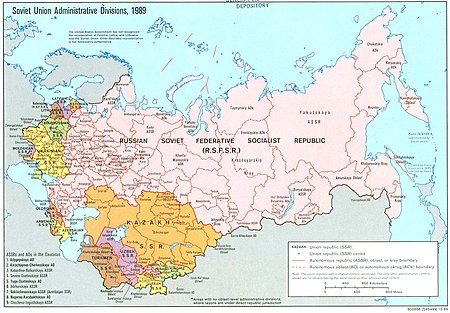
Citizens and nationals of the Soviet Union Soviets redirects here. For the bygone political organizations in Russia, see Soviet (council). For other uses, see Soviet (disambiguation). Ethnic group Soviet peopleСоветский народFlag of the Soviet UnionMap of the country's constituent Union Republics in 1989Total population286,730,819 (1989 census)LanguagesRussian,[1] Ukrainian, Belarusian, Kazakh, Azerbaijani, Georgian, Armenian, Uzbek, Kyrgyz, Tajik, Turkmen, Latvian, Estonia…

This article appears to contain a large number of buzzwords. There might be a discussion about this on the talk page. Please help improve this article if you can. (October 2021) Study of interactions between societies and their natural environments This article includes a list of general references, but it lacks sufficient corresponding inline citations. Please help to improve this article by introducing more precise citations. (September 2020) (Learn how and when to remove this message) An ecov…
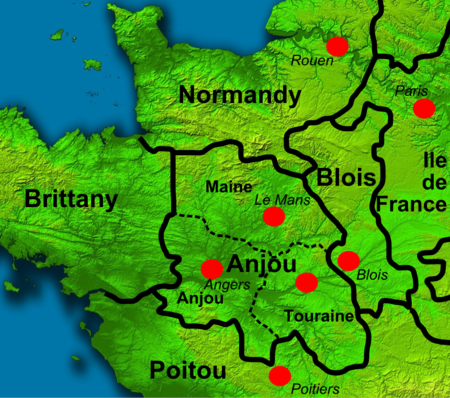
King of England from 1154 to 1189 Henry Plantagenet redirects here. For others, see House of Plantagenet. Henry IIContemporary depiction of Henry from the Gospels of Henry the Lion, c. 1175–1188King of EnglandReign19 December 1154 – 6 July 1189Coronation19 December 1154PredecessorStephenSuccessorRichard IJunior kingHenry the Young King (1170–1183)Duke of Aquitaine (jure uxoris) Reign18 May 1152 – 6 July 1189PredecessorLouis VIISuccessorRichard IServing withEleanorCount of AnjouReig…

Art discipline that uses sound as a medium This article needs additional citations for verification. Please help improve this article by adding citations to reliable sources. Unsourced material may be challenged and removed.Find sources: Sound art – news · newspapers · books · scholar · JSTOR (August 2022) (Learn how and when to remove this message) Sound art is an artistic activity in which sound is utilized as a primary medium or material. Like many gen…

Daily newspaper serving Tuscaloosa, Alabama, US The Tuscaloosa NewsThe November 3, 2008 front cover of The Tuscaloosa NewsTypeDaily newspaperFormatBroadsheetOwner(s)GannettGeneral managerBobby RiceFounded1818Headquarters315 28th AvenueTuscaloosa, Alabama 35401Circulation14,208 (as of 2018)[1]Websitetuscaloosanews.com The Tuscaloosa News is a daily newspaper serving Tuscaloosa, Alabama, United States, and the surrounding area in west central Alabama. It is owned by Gannett. Tuscaloosa…

Belgian dancer and choreographer Sidi Larbi CherkaouiSidi Larbi Cherkaoui in 2009Born (1976-03-10) 10 March 1976 (age 48)Antwerp, BelgiumOccupation(s)Choreographer, dancer, director Sidi Larbi Cherkaoui (born 1976) is a Belgian dancer and choreographer and director. He has made over 50 choreographic pieces and received two Laurence Olivier Award for Best New Dance Production, three Ballet Tanz awards for best choreographer (2008, 2011, 2017), the KAIROS Prize (2009)[1] and the Europ…
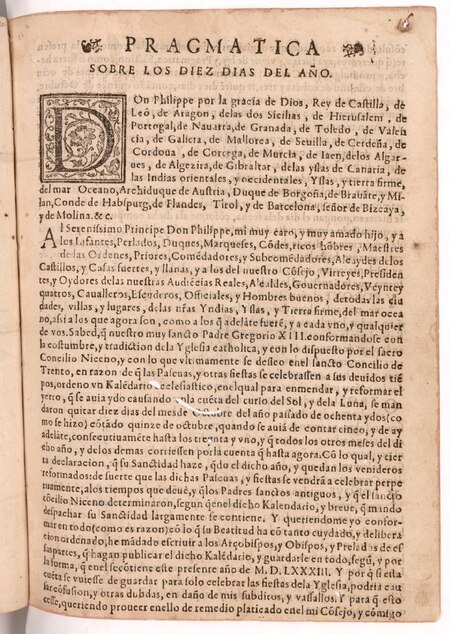
Calendario gregoriano martes, 25 de junio de 2024 d. C.Calendario juliano martes, 12 de junio de 2024 d. C.Actualizar fechasGregorio XIII El calendario gregoriano es el modelo de calendario actualmente utilizado de manera oficial en casi todo el mundo, denominado así por ser su promotor el papa Gregorio XIII. A partir de 1582, sustituyó gradualmente en distintos países al calendario juliano, utilizado desde que Julio César lo instaurara en el año 46 a. C. El calendario julian…

سفارة سريلانكا في واشنطن العاصمة الإحداثيات 38°55′01″N 77°02′56″W / 38.9169°N 77.0489°W / 38.9169; -77.0489 البلد الولايات المتحدة المكان واشنطن العاصمة الاختصاص الولايات المتحدة، والمكسيك[1]، وترينيداد وتوباغو[2] الموقع الالكتروني الموقع الرسمي …

Roger Marshall Marshall mars 2021. Ledamot av USA:s senat från Kansas Innehar befattningen Tillträdde befattningen 3 januari 2021tillsammans med Jerry Moran Företrädare Pat Roberts Ledamot av USA:s representanthus Tid i befattningen2017–3 januari 2021 Företrädare Tim Huelskamp Efterträdare Tracey Mann Valkrets Kansas 1:a Född 9 augusti 1960 (63 år)El Dorado, Kansas Politiskt parti Republikanska partiet Yrke obstetriker Roger Wayne Marshall, född 9 au…

Pour les articles homonymes, voir Aiguier (homonymie). Un aiguier, en Provence, est une citerne creusée dans la roche et voûtée de pierres, servant à recueillir les eaux de ruissellement[1]. Étymologie Le terme provençal correspondant au français « aiguier » est aiguié (selon la graphie mistralienne)[2], l'un comme l'autre issus du latin acquarium. Les aiguiers de Saint-Saturnin-lès-Apt Il existe au nord-est de Saint-Saturnin-lès-Apt dans le Vaucluse, un « pays des ai…

经济系列芝加哥經濟學派 运动自由意志主义新自由主义积极不干预主义 组织卡托研究所理性基金会乔治梅森大学经济学与自由图书馆 主张货币主义新古典主义经济学结果主义的自由意志主義 人物戴维·弗里德曼米尔顿·弗里德曼罗斯·弗里德曼法蘭克·奈特罗纳德·科斯罗伯特·福格尔 蓋瑞·貝克小罗伯特·卢卡斯乔治·斯蒂格勒弗里德里希·哈耶克(辅助) 理论比较优势消费者…
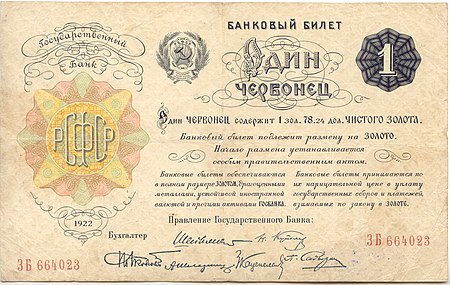
1921–28 Soviet economic policy theorized by Lenin For the Malaysian policy enacted in 1971, see Malaysian New Economic Policy. It has been suggested that NEPman be merged into this article. (Discuss) Proposed since April 2024. Politics of the Soviet Union Leadership Leaders President list Vice President Collective leadership State Council Presidential Council Communist Party Congress Central Committee History General Secretary Politburo Secretariat Orgburo Legislature Congress of Soviet…

Japanese sports newspaper Not to be confused with Daily Sports (Japanese newspaper). You can help expand this article with text translated from the corresponding article in Japanese. (October 2021) Click [show] for important translation instructions. View a machine-translated version of the Japanese article. Machine translation, like DeepL or Google Translate, is a useful starting point for translations, but translators must revise errors as necessary and confirm that the translation is acc…

Former lower house of the Parliament of Venezuela The Chamber of Deputies (Spanish: Cámara de Diputados) was the lower house of Venezuela's legislative under its 1961 constitution; the Venezuelan Senate was the upper house. Under the 1999 constitution, the bicameral system was replaced by the unicameral National Assembly of Venezuela. Palacio Federal Legislativo At the 1993 Venezuelan parliamentary election, the Chamber saw the introduction of a mixed member proportional representation system,&…
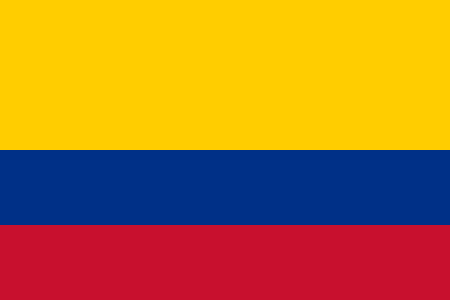
2018年冬季奥林匹克运动会哥伦比亚代表團哥伦比亚国旗IOC編碼COLNOC哥伦比亚奥林匹克委员会網站olimpicocol.co(西班牙文)2018年冬季奥林匹克运动会(平昌)2018年2月9日至2月25日運動員4參賽項目3个大项旗手开幕式:珮卓·阿曼多·卡烏希爾(速度滑冰)[1]闭幕式:Michael Poettoz(高山滑雪)[2]獎牌榜 金牌 銀牌 銅牌 總計 0 0 0 0 历届奥林匹克运动会参赛记录(总结)夏�…


























































































































































































































